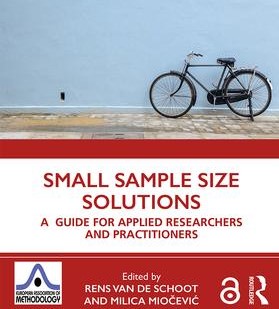Small Sample Size Solutions: A Guide for Applied Researchers and Practitioners.
This unique resource provides guidelines and tools for implementing solutions to issues that arise in small sample research, illustrating statistical methods that allow researchers to apply the optimal statistical model for their research question when the sample is too small.
Researchers often have difficulties collecting enough data to test their hypotheses, either because target groups are small or hard to access, or because data collection comes with prohibitive costs. Such obstacles may result in data sets that are too small for the complexity of the statistical model needed to answer the research question. This essential book will enable social and behavioral science researchers to test their hypotheses even when the statistical model required for answering their research question is too complex for the sample sizes they can collect. Featuring models ranging from the estimation of a population mean to models with latent variables and nested observations, and solutions including both classical and Bayesian methods for synthesizing data, all proposed solutions are described in steps researchers can implement with their own data and are accompanied with annotated syntax in R.
The methods described in this book will be useful for researchers across the social and behavioral sciences, ranging from medical sciences and epidemiology, to psychology, marketing, and economics.
van de Schoot, R. (Ed.), Miočević, M. (Ed.). (2020). Small Sample Size Solutions (Open Access). London: Routledge, https://doi.org/10.4324/9780429273872
The book will appear open access, but if you like to have it on paper you can get a 20% discount enter the code FLR40 at checkout*. Available for pre-order. Item will ship after 28th February 2020
* Offer cannot be used in conjunction with any other offer or discount and only applies to
books purchased directly via our website.
We put all the relevant information needed to replicate our findings, on the Open Science Framework (OSF; see https://osf.io/bq28j/ ).
In her current projects, Milica is focusing on optimal methods for data synthesis from non-exchangeable studies, on the consequences of specifying inaccurate priors in mediation models, and on issues that arise in applications of Bayesian mediation analysis with informative prior distributions in small samples.


